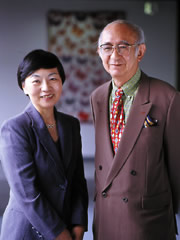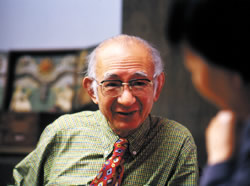| Biohistory journal,Autumn, 2003: Index >The Romance and Heart of Biology |
| Dialogue/Philos The love for cells The Romance and Heart of Biology Tokindo Okada and Keiko Nakamura |
|
|
|
| Both of us have strong feelings of love toward nature and an interest in knowledge, but I learned that we don't seem to be science people. It might be that research into living creatures is not something that, in its essence, can be categorized as science. It is important that we view the 21st century as an era that deals with life itself, rather than life sciences, and creating our knowledge from that. The theme of biohistory has become clear. (Keiko Nakamura) |  |
 |
Concluding the dialogue / Tokindo Okada |
| Conducting a dialogue for public consumption with a person one regards as a family member is truly a futile endeavor. That's because being formal with someone with whom one regularly associates makes me feel embarrassed. Neither my head nor my tongue work properly. This dialogue is with Keiko Nakamura, the Director of the Biohistory Research Hall. She is a close colleague who is much like a family member, and a person I have known for well over 10 years, since the founding of BRH was in its embryonic stage. Thankfully, however, my partner in this dialogue was a person of her evident ability as well as a close colleague. For me, who has not spoken out or written so much, that was the key to discussing subjects that could stimulate my innate frankness. That was a fantastical impression in which my love for conducting experiments emerged, not merely a discussion of living creatures as the subject of my research, or my research results. Perhaps, before long, there will be a time and people who discover the beauty of conducting experiments for genome research too. It is for that reason that today's life sciences may well become a new civilization and culture. |
| Literature, art, and science expand around nature. We wonder if Love is the word linking all of these, centered on life. |
 |
 |
The great, basic contradiction of whether one can love the elements of biotechnology has recently been on my mind. |
| From the editorial department |
| A fax came from Dr. Okada the day before the interview asking whether his photographs would be in black and white or color. We told him that everyone was looking forward to seeing what he would wear, so of course they would be in color. At first, he told the photographer he would be wearing a navy blue shirt. Just before the dialogue began, however, he had second thoughts and took out a freshly laundered apple-green shirt. When it was suggested that the green shirt might be better, he quickly agreed and changed into the new shirt. Keiko Nakamura, on the other hand, was quite relaxed, and stuck with her original choice of gray. When the focus of biology in Europe changed from natural history to experimental biology, the change came at the oceanographic institutes. Perhaps these institutes had an openness and a love of subject different from that of inland universities. This created the trend in contemporary biology. Come to think of it, the Mediterranean also had an influence on European art. But Dr. Okada insists on fresh water. He claims the beauty in the transition from egg to fetus is limited to the newt. This is the starting point for philos (love). To observe carefully the changes presented by living creatures over time and search for their beauty. This is also present in literature and art. They are all at the heart of life. Dr. Okada has advanced the traditional study of developmental biology prevalent from the 18th century with an approach based on the cell and molecules. Dr. Nakamura sought a method to truly learn about living creatures while carefully observing E.coli during the height of attention on molecular biology, a new type of biology created from physics. Then, there is biohistory, which connects the two participants. The dialogue between the former and current directors of the Biohistory Research hall, who have a combined half century of history and careful contemplation, provides the sense that a new knowledge of life will emerge from philos (love). This indeed is a worthy topic for BRH. |
| Tokindo Okada Born in Itami, Hyogo Prefecture, in 1927. Graduated from the School of Science at Kyoto University. He has served as a professor at Kyoto University, the director of Okazaki National Research Institutes' National Institute for Basic Biology, the director of the Okazaki National Research Institute, and vice-president of the International Union of Biological Sciences. Currently professor emeritus at Kyoto University, Dr. Okada was the director of the JT Biohistory Research Hall from 1993 to March 2001. He now serves as special advisor to the Hall. |
| Dialogue |
|
Please close a window with the button of a browser who are turning off Javascript. |